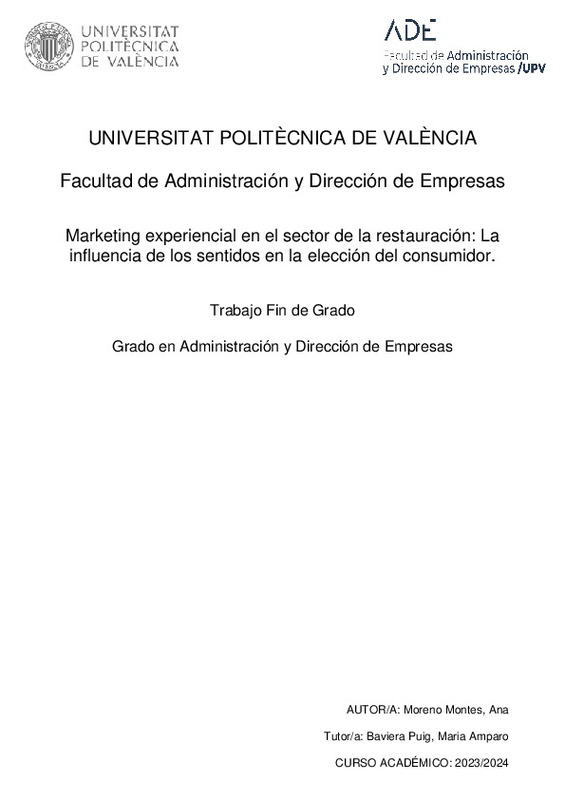|
Resumen:
|
[ES] La industria de la restauración es altamente competitiva y la fidelidad del cliente es crucial. Los restaurantes se esfuerzan por ofrecer una experiencia gastronómica única y memorable a sus clientes. En este contexto, ...[+]
[ES] La industria de la restauración es altamente competitiva y la fidelidad del cliente es crucial. Los restaurantes se esfuerzan por ofrecer una experiencia gastronómica única y memorable a sus clientes. En este contexto, el marketing experiencial se presenta como una herramienta innovadora para ofrecer a los clientes algo más que una simple comida.
Esta disciplina busca la diferenciación, creando experiencias a través de la vista, el oído, el gusto, el tacto y el olfato. Mediante estas experiencias, se pretende reforzar los valores y características esenciales del producto o servicio.
Desde hace años, muchas teorías han demostrado que los seres humanos no somos tan racionales y que el acto de compra no puede considerarse ya como un acto puramente lógico. Muchas de nuestras decisiones se basan en procesos no conscientes que no son tan fáciles de entender con solo preguntar a estos consumidores. Puede deducirse que los sentidos y las emociones son la razón final que nos hace movernos y acordarnos de las marcas.
Este trabajo tiene como objetivo analizar la aplicación del marketing experiencial en el sector de la restauración y su impacto en la experiencia gastronómica. De la misma manera, se busca determinar qué estrategias se utilizan en los puntos de venta físicos con el fin de comprender cómo pueden los sentidos y las emociones mejorar la fidelidad a la marca y, por ende, una mejora de la concepción de este servicio.
Para lograr los objetivos de este trabajo, se realiza un análisis de fuentes primarias y secundarias. La primera fase consiste en revisar diversas fuentes secundarias. Seguidamente se complementa este estudio con las fuentes primarias, específicamente, se ha optado por emplear el método de observación y las entrevistas a expertos.
[-]
[EN] The restaurant industry is highly competitive and customer loyalty is crucial. Restaurants strive to offer a unique and memorable dining experience to their customers. In this context, experiential marketing presents ...[+]
[EN] The restaurant industry is highly competitive and customer loyalty is crucial. Restaurants strive to offer a unique and memorable dining experience to their customers. In this context, experiential marketing presents itself as an innovative tool to offer customers more than just a meal.
This discipline seeks differentiation by creating experiences through sight, sound, taste, touch and smell. Through these experiences, the aim is to reinforce the core values and characteristics of the product or service.
For years, many theories have shown that human beings are not so rational and that the act of buying can no longer be considered a purely logical act. Many of our decisions are based on non-conscious processes that are not so easy to understand just by asking these consumers. It can be deduced that senses and emotions are the final reason that makes us move and remember brands.
The aim of this work is to analyse the application of experiential marketing in the restaurant sector and its impact on the dining experience. In the same way, it seeks to determine what strategies are used in physical points of sale in order to understand how the senses and emotions can improve brand loyalty and, therefore, an improvement in the conception of this service.
To achieve the objectives of this work
[-]
|







